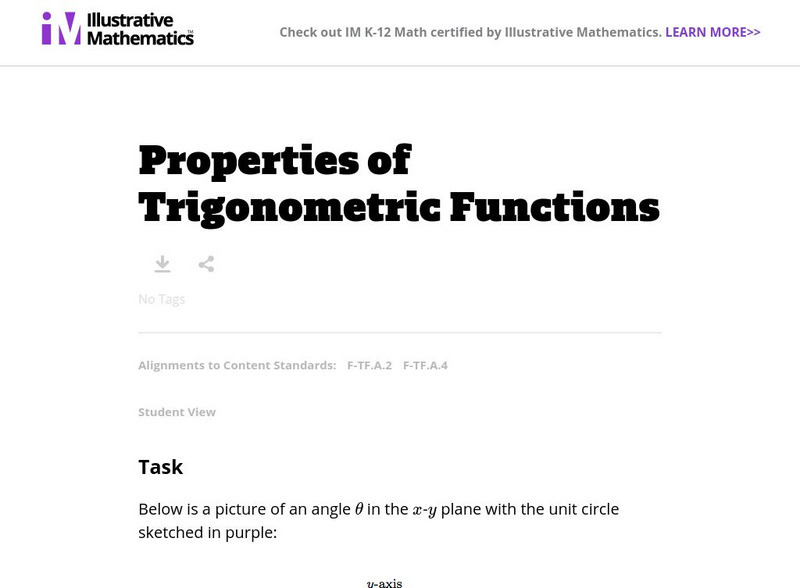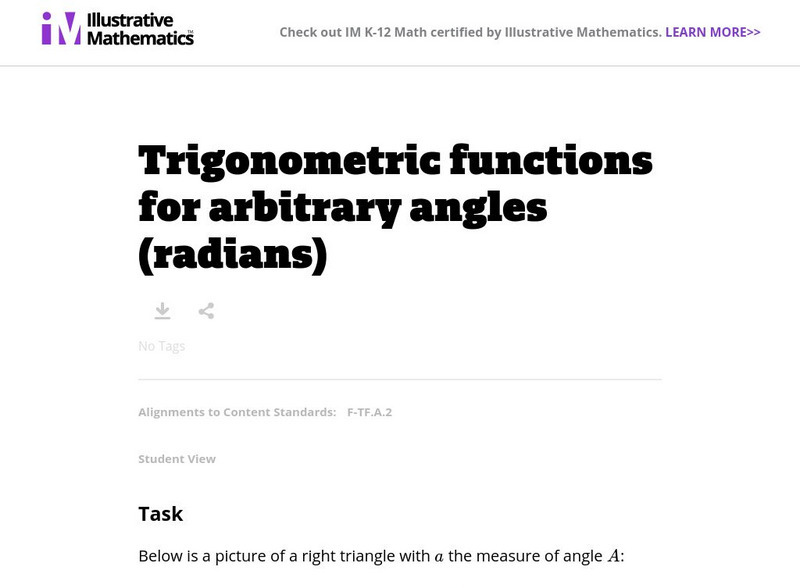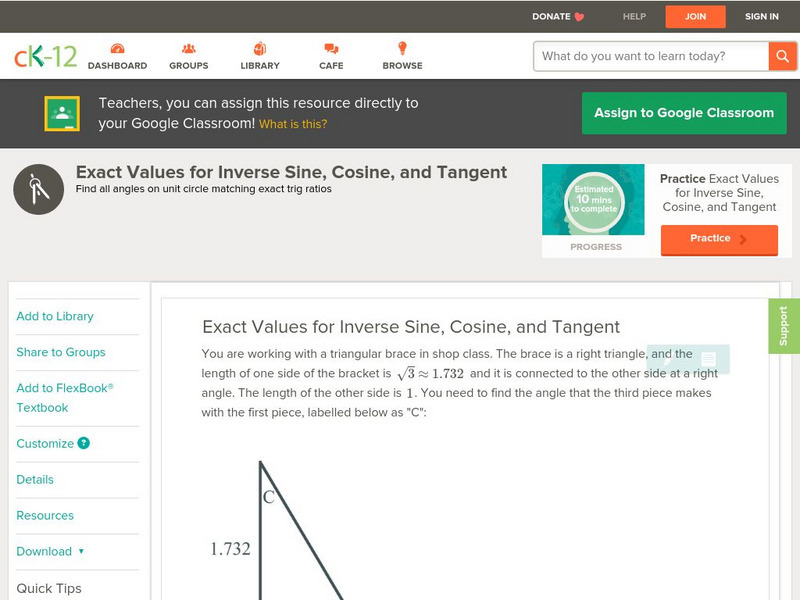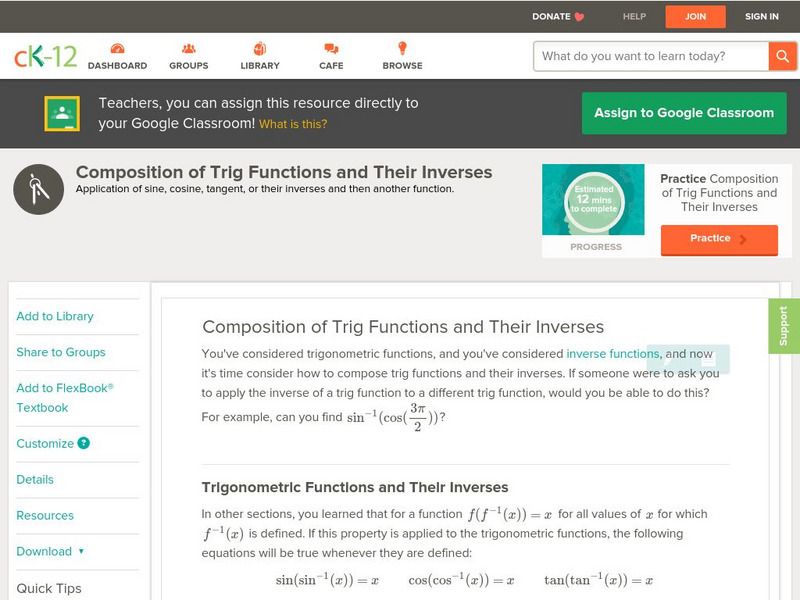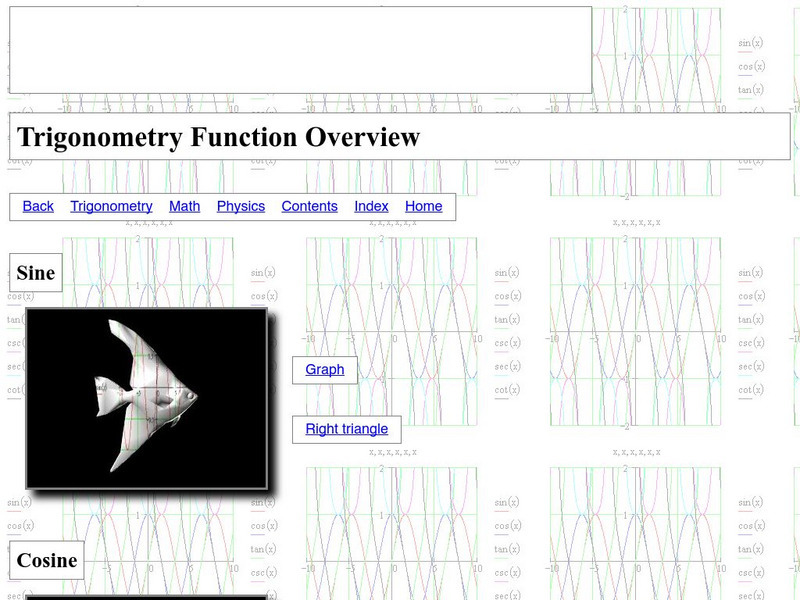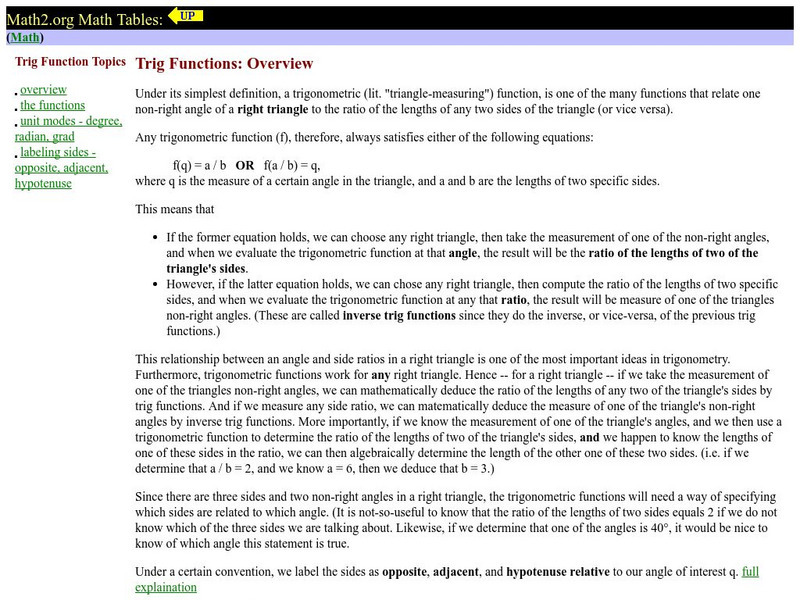Math Planet
Math Planet: Algebra 2: Circular Functions
Explanation of circular functions through the use of examples and a video lesson. [1:10]
Paul Dawkins
Paul's Online Notes: Trig Functions
In this section we will give a quick review of trig functions. We will cover the basic notation, relationship between the trig functions, the right triangle definition of the trig functions. We will also cover evaluation of trig...
Illustrative Mathematics
Illustrative Mathematics: F Tf, G Co, Trigonometric Identities and Rigid Motions
The purpose of this task is to apply translations and reflections to the graphs of the functions f(x)=cos x and g(x)=sin x in order to derive some trigonometric identities. There are also rotations 180 degrees about points on the x-axis...
Illustrative Mathematics
Illustrative Mathematics: F Tf Trig Functions and the Unit Circle
The purpose of this task is to help students make the connection between the graphs of sin t and cos t and the x and y coordinates of points moving around the unit circle. Students have to match coordinates of points on the graph with...
Illustrative Mathematics
Illustrative Mathematics: F Tf Properties of Trigonometric Functions
The goal of this task is to use the unit circle and rigid transformations in order to establish some fundamental trigonometric function identities. Aligns with F-TF.A.2 and F-TF.A.4.
Illustrative Mathematics
Illustrative Mathematics: F Tf Trigonometric Functions for Arbitrary Angles
The purpose of this task is to examine trigonometric functions for obtuse angles. Aligns with F-TF.A.2.
Khan Academy
Khan Academy: Algebra Ii: Trig Values of Special Angles
Find the sine and cosine of special angles, which are angles whose trig values we can determine without the use of a calculator. Students receive immediate feedback and have the opportunity to try questions repeatedly, watch a video or...
Analyze Math
Analyze Math: Table for the 6 Trigonometric Functions for Special Angles
Learners explore the special angles for the six trigonometric functions. The special angles can be used to solve trigonometry problems. The table gives the values of sine, cosine, tangent, cotangent, secant, and cosecant for special angles.
Mathigon
Mathigon: Geometry: Circle and Pi: Degrees and Radians
Rather than dividing a circle into some number of segments (like 360 degrees), mathematicians often prefer to measure angles using the circumference of a unit circle - a circle with radius 1. This way of measuring angles is called...
CK-12 Foundation
Ck 12: Exact Values for Inverse Sine, Cosine, and Tangent
[Free Registration/Login may be required to access all resource tools.] Find all angles on the unit circle matching exact trig ratios. Resource includes examples, videos, and practice problems.
CK-12 Foundation
Ck 12: Trigonometry: Composition of Trig Functions and Their Inverses
[Free Registration/Login may be required to access all resource tools.] How to Compose a trigonometric function.
CK-12 Foundation
Ck 12: Trigonometry: Trigonometric Functions and Angles of Rotation
[Free Registration/Login may be required to access all resource tools.] Describing trig functions as relationships on the unit circle.
CK-12 Foundation
Ck 12: Algebra Ii: 4.4 Radians
This section introduces radians an alternative to degrees as a way to measure the rotation around a circle. It also begins to draw connections between radians and trigonometric identities.
CK-12 Foundation
Ck 12: Algebra Ii: 4.3 the Unit Circle
Activities in this lesson explore how to identify the coordinates where special right triangles intersect with the unit circle in all four quadrants, use both degrees and radians to identify angles, and explore angles of different sizes...
CK-12 Foundation
Ck 12: Algebra Ii: 4.2 Right Triangle Trig Extended to Circles With a Model
This section explores the relationship between right triangles, circles, and trigonometry. It investigates how a right triangle that is set inside a circle and rotates around the circle is connected to trigonometric functions and their...
CK-12 Foundation
Ck 12: Algebra Ii: 4.5 Graphing Sine and Cosine
This section explores the graphs of sine and cosine functions. It investigates how these graphs are related to coordinates for different angles in a unit circle.
Purple Math
Purplemath: The Unit Circle
Relates the unit circle to the method for finding trig ratios in any of the four quadrants. Demonstrates how the unit circle might be useful.
Curated OER
Zona Land: Overlapped Graph of the Six Trig Functions
An overview of the six trig functions and their graphs. The site is a little difficult to navigate but is good for finding a graph of a trig function.
Math2
Math2.org: Trigonometry Functions
A complete look at trig functions. From an "overview," page giving general definitions and important vocab words, to a listing of the 12 trig functions, to an explanation of the three modes used in trigonometry, to the procedures of how...
Math2
Math2.org: Trigonometry Tables
Three trig tables are provided for student and teacher reference. The first table lists the sine, cosine, tangent, secant, cosecant, and cotangent values of all whole-number angles from 0 to 90. The radian equivalent (to four decimals)...
Wolfram Research
Wolfram Math World: Cosecant
Graphs of the cosecant function, both 2-dimensional and 3-dimensional. This site from Math World tells the relation between cosecant and sine. If you are not familiar with the sine function there is a link for a better understanding....
Wolfram Research
Wolfram Math World: Trigonometric Functions
This site provides a listing of the trigonometric functions and their inverses. Their notation is also addressed along with links to each of the fundamental trigonometric functions.
Windstream
Ojk's Pre Calculus Study Page: The Four Other Trig Functions
Trigonometry ratios and their signs are given in this explanation of the other trig functions. Graphs of tangent, cotangent, secant, and cosecant are given. Examples are included.
Windstream
Ojk's Precalculus Study Page: More Difficult Trig Equations
An introduction to solving trigonometric equations by using the reciprocal, negative, Pythagorean, and cofunction identities. Includes several examples and exercises with solutions at the bottom of the page.






